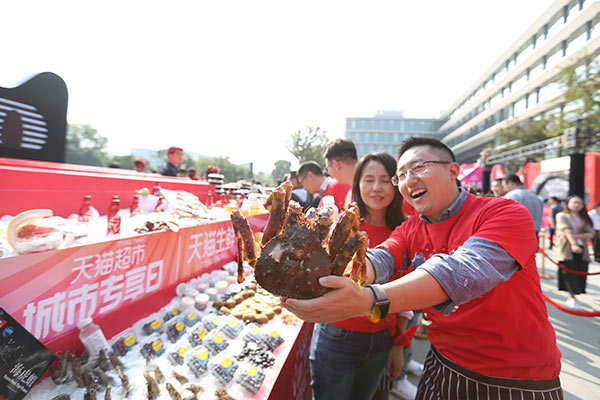E-tailers up the ante ahead of Singles Day extravaganza
 |
|
An employee from Tmall shows a hairy crab during a promotion for food products ahead of the Singles Day shopping gala in Hangzhou, Zhejiang province.[Provided to China Daily] |
Online shopping platforms such as Tmall, JD.com and Amazon.com have made early starts to build up anticipation ahead of the major event by launching pre-sale activities.
Tmall, an online platform of e-commerce giant Alibaba Group Holding Ltd, is attracting customers by dishing out promotions on more than 15 million products from 140,000 brands on its marketplace. The company will also up the ante in its social media efforts by providing more interactive content and entertainment, said Daniel Zhang, CEO of Alibaba.
For instance, Tmall has organized a catwalk show featuring major brands such as Adidas, Estee Lauder and Victoria's Secret that is broadcast across several media platforms. Consumers who are interested in a product that is currently on the ramp can shake their phones, and this action prompts the system to bring up the product page on the screen.
Other e-commerce companies are also drumming up the shopping bonanza by expanding the selections of overseas products to Chinese consumers. Amazon.com Inc said it will expand the selections of its products in Amazon Global store, as well as speed up the logistics and delivery operations. JD.com Inc said its Nov 11 global shopping Festival will cover more than 200 countries and regions this year.
However, the type of promotions that have left many consumers annoyed are those that require a down payment or involve redeeming virtual coupons.
In many cases, customers are encouraged to place a deposit at least three days ahead of the actual sales, because such deposits will also function as a discount. For instance, a 100 yuan ($15.09) deposit would result in a 200 yuan discount or more when the transaction is processed on Nov 11. Some shopping sites have also distributed cash incentives hidden in virtual red packets during specific periods.
Some online vendors have even resorted to creating the illusion of a discount by deliberately raising the original prices of their products before slashing them.
"Even if you don't mind being tethered to your laptop for that 50-yuan discount coupon, online traffic can overwhelm sites during peak time, causing them to crash," said Chen Ziwen, the mother of a 1-year-old child in Shanghai who has been busy shopping for infant formula. "And by the time the site is back up, all the coupons have already been snatched up."
The purpose of the deposit is for merchants to predict sales so as to avoid delivery congestion. But these tactics have caused customer experience to suffer, deterring notably wealthier customers, said Shaun Rein, founder and managing director of China Market Research Group.
Nearly 80 percent of consumers polled by Nielsen said they are most intrigued by the Nov 11 sales, with more people looking to try out new items instead of simply bagging a bargain, according to Tommy Hong, vice-president of Nielsen China, a market research firm.









